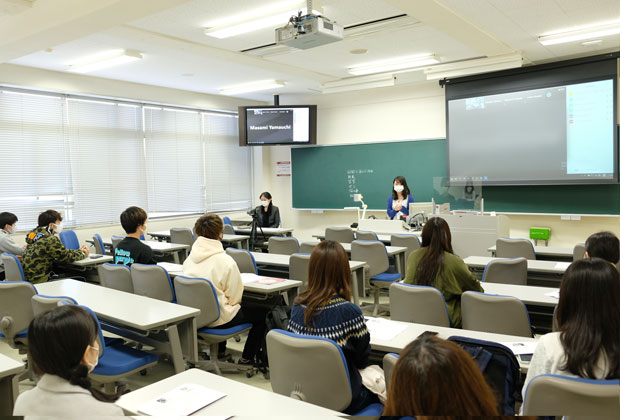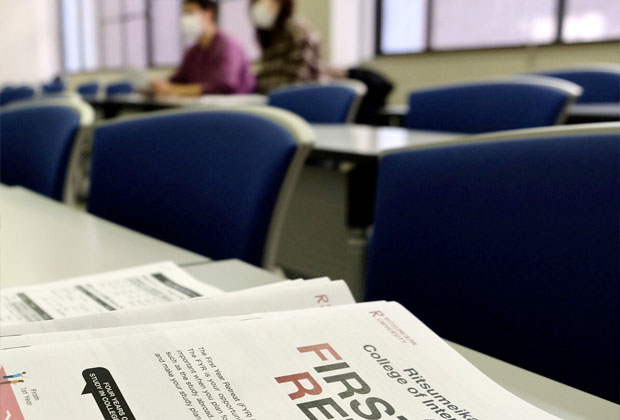TOPICS
TOPICS
Graduation Ceremony was held
On March 20, the Ritsumeikan University Undergraduate and Graduate School Graduation Ceremony was held. There, 264 students from the College of International Relations and 18 students from the Graduate School of International Relations were awarded Bachelor’s and Master’s degrees.
In the ceremony, Dean Kimijima, Dean Masuda and a alumni representative gave messages.
By reflecting diverse community of college, student representatives from International Relations Major(from Japan) and Global Studies Major (from Thailand) made address in Japanese and English.
Many family members and friends of graduates, faculty and staff members were there to celebrate. Graduates will soon start their new careers here in Japan and around the world.
Graduates, congratulations and good luck on your future!
For details please access to Ritsumeikan Website
Ritsumeikan students discussed the future with Israeli and Palestinian professionals in Kyoto
A special meeting between students of Ritsumeikan University and young Israeli and Palestinian professionals who were visiting Japan under the Youth Invitation Program by the Ministry of Foreign Affairs of Japan was held at Kinugasa Campus of Ritsumeikan University on Friday, February 15. The purpose of the Program is to promote mutual confidence-building between the Israelis and the Palestinians and to deepen their understanding of Japan's efforts for the Middle East peace, with a view to helping both parties to realize a peaceful coexistence (Ministry of Foreign Affairs of Japan).
10 young Israeli and Palestinian professionals from the government organizations, media, and IT and other business industries and 20 undergraduate and graduate students including the international students from India and Indonesia discussed the issues to come to a settlement in Israeli and Palestinian territories and the involvement of the international community under the direction of Prof. Mitoji Yabunaka, a former Vice-Minister of Foreign Affairs. The exchange of opinions on the situations that Ritsumeikan students have understood from the media etc. helped them to think about the Israeli-Palestinian conflict at deeper level.
The College of International
Relations at Ritsumeikan University has been actively working on human
resources development in the area of Foreign affairs, international
cooperation, and official business through the establishment of the International
Civil Service Program, the lecture by Prof. Mitoji Yabunaka, the support by the
Extension Center, and so on. Two alumni who will start working at the Ministry
of Foreign Affairs of Japan also joined the special meeting.
<Related links>
"Youth Invitation Program from Israel and the Palestinian Territories in 2019" (Japanese only)
To read the article, please click here.
"Foreign Minister Kono received a courtesy call from young Israeli and Palestinian professionals who were visiting Japan under the Youth Invitation Program" (Japanese only)
To read the article, please click here.
Final Round of Open Seminar competition was held
On December 8th (Sat), College of IR held the Open Seminar Competition by our students at Hall 1, Igakukan, before its commemoration ceremony and symposium.
Four teams, Minamikawa Seminar, Nishimura Seminar, Honna Seminar and Suechika Seminar won the qualifying tournament and eagerly gave a presentation about their topics. After presentations, the participants were questioned by professional judges who came from companies and academic fields. It was a precious and rewarding experience for students.
After careful considerations, Honna seminar won the competition. They made a unique presentation which included a role play that was assumed by “Policy makers of Japan and Indonesia”, and “Honna seminar, who played the role of professionals of area studies”. Their presentation attracted audiences. Lunch reception and poster session also achieved success. Students and guests enjoyed exchanging their opinions over a light meal. Over 200 attendants from companies, academic institutions, alumni, students and Ritsumeikan Uji high school students attended the program. Comments like “Very useful discussion”, “High presentation skills”, “Well-made presentation” etc. were given by guests.
May we take this opportunity to thank all those guests who attended this competition and all operation staff.
Wakana Hattori (student committee member)
Farewell lecture by Prof. Nakatsuji
In Jan 7th2019,Prof. Keiji Nakatsuji, who will finish his tenure in March made his farewell lecture in Kinugasa campus. Prof. Nakatsuji made an lecture titled “The End of the Cold War, Decline of Historicism, and My Scholarly Life"..
For students and colleague professors, who packed the classroom, Prof. Nakatsuji emphasized importance of “the deep and extensive knowledge of history” and “the decline of historicism is too dangerous to take for granted”. Prof. Nakatsuji joined Ritsumeikan in 1998 and contributed to various key programs for its internationalization like “Ritsumeikan International Institute".
Prof. Nakatsuji will continue his teaching at College of IR as a professor emeritus.
Office closing (9/4)
Due to the typhoon, office will be closed in 9/4.
Thank you for your understandings.
Office College & Graduate School of International Relations
Summer office our and summer break closing
-IR Office will be closed for Summer break -
Our office will be closed from August 11
to August 19, 2018 for Summer holidays.
We are sorry for the inconvenience we may cause.
*Summer Recess; From August 2nd to Sep 25th, Office Hours start from 1pm to 5pm.
Office will be closed in August 29th for staff training.
Thank you for your understandings.
Administrative Office
College of International Relations Ritsumeikan University
Graduate School of International Relations Ritsumeikan University
Onsite and Online: A Hybrid event, First Year Retreat was held

The College of IR held a hybrid event, First Year Retreat on November 23. The First Year Retreat is an opportunity for the first year students to think about their learning paths such as selecting a zemi group and writing a thesis through an interaction with graduates. It was a hybrid event this year to provide the option for remote participation, and graduates working in the governmental organizations, IT industry, automaker, consulting firm, and trading companies shared their experiences with students in both Japanese and English.


“I felt at ease because the event helped me to have an image of my college life,” “The information from the graduates was very helpful,” “I understood the importance of taking various chances provided by Ritsumeikan to create a successful college experience,” “I would like to make full use of learning opportunities at Ritsumeikan.” These are the feedback from the first year students. The event surely encouraged students who have been anxious about their college life due to the pandemic.
The College of IR has been providing students including those staying outside Japan due to the pandemic with various opportunities to learn both online and offline.
*The event was held in cooperation with the College of IR, Office of Student Affairs, and Career center.
Alumni Profiles
IR major *Information sessions were held in Japanese
- Multinational Automobile Manufacture
- IT Company
- International Trade Company
- Risk management consultant
- UNV, JIVA JOCV, National Public Officer
- National public officer
- HR consultant
- Graduate School (Graduate School of International Relations)

